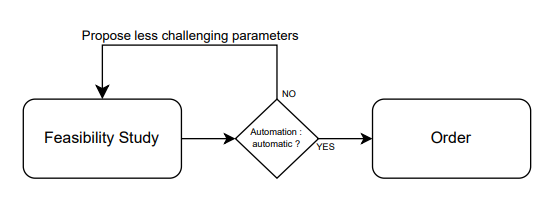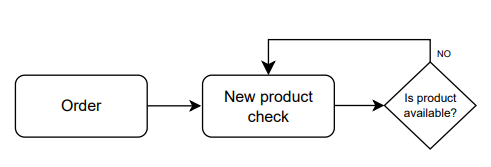Language
Automated Tasking
One of the main advantages of using APIs is to create automated processes which do not require human intervention. This can be challenging when some tasking requests require feasibility studies before you can accept or deny your order. Here are some methods you may want to follow to limit human interactions in your process.
Automated Tasking
Feasibility study
Automatic acceptance parameters
The feasibility study is a process required to determine if the tasking request can be completed under the requested parameters, including: cloud coverage, incidence angle and the time frame for collection. The final step of this process includes a tasking proposal from the Airbus Tasking team as well as a validation to launch the process. The following parameters will guarantee that the feasibility study is not mandatory and the tasking will automatically be accepted:
maxCloudCover >= 10
maxIncidenceAngle >= 20
acquisitionMode = MONO
For SPOT and Pléiades, feasibility study endpoints work only with ONEPLAN
ONEPLAN requires the timespan to be at least 30 days for automatic tasking and at least 60 days for EASY classification.
ONEDAY and ONENOW ATTEMPTS depend on the satellite orbit but have no timeline requirement
ONENOWWEATHER requires the timespan to be at least 3 days for automatic tasking
AOI constraints for automatic acceptance
For OneDay and OneNow
| Pléiades Neo | Pléiades | SPOT 6/7 | |
|---|---|---|---|
| Minimum area invoiced (km2) | 100 | 100 | 500 |
| Minimum AOI area (km2) | 24.5 | 25 | 100 |
| Maximum AOI area (km2) | 400 | 800 | 7200 |
| Maximum AOI height (km) | 30 | 40 | 120 |
| Maximum AOI width (km) | 13 | 18.9 | 50 |
For OnePlan
| Pléiades Neo | Pléiades | SPOT 6/7 | |
|---|---|---|---|
| Minimum area invoiced (km2) | 100 | 100 | 500 |
| Minimum AOI area (km2) | 5 | 5 | 5 |
| Maximum AOI area (km2) | n/a | n/a | n/a |
| Maximum AOI height (km) | 10000 | 10000 | 10000 |
| Maximum AOI width (km) | 10000 | 10000 | 10000 |
Workarounds
If you send a request to the check feasibility endpoint (see Step 3: Check Feasibility) and the response defines your order automation as MANUAL, you can change the parameters to be less challenging. If the parameters are good enough, your tasking can be automatically accepted and you may skip this step.

For Pléiades Neo tasking requests , the best option to avoid human validation is to request a quotation. If the feasibility study cannot be validated through an API, a quotation, on the other hand, can be fully handled with an automated process. Since the quotation includes the feasibility study step, you can request a quotation for tasking (Step 6: Request a quotation), then either accept or refuse the quotation once it’s available. As a reminder, once the quotation is accepted, the order is passed automatically (Manage quotations).

Accept proposed acquisition
Pléiades and SPOT are working at segment level while Pléiades Neo is acquiring smaller targeted locations. at coverage item (1 target is by default a scene equivalent). The process is the same for Pléiades Neo as well as Pléiades and SPOT but the endpoints slightly differ. As a reminder, acquisitions require your validation if they do not fill the required conditions for direct production but fit into the threshold value you have set during the order. First, you need to check if acquisitions requiring your attention are available (generally new acquisitions), then you store its reference and decide to accept or reject it.
For Pléiades and SPOT:
For Pléiades Neo:

Product delivery Notifications
Once your tasking request is complete and your product is delivered, you may want to be notified without checking your email. In that case, you can use an automatic workflow to send a periodic request to the opensearch endpoint to check if your product is available. In order to reach maximum efficiency, you can use your customer reference to understand if your order has been delivered.

© Airbus Defence and Space 2022. All rights reserved. Privacy Policy | Legal Information